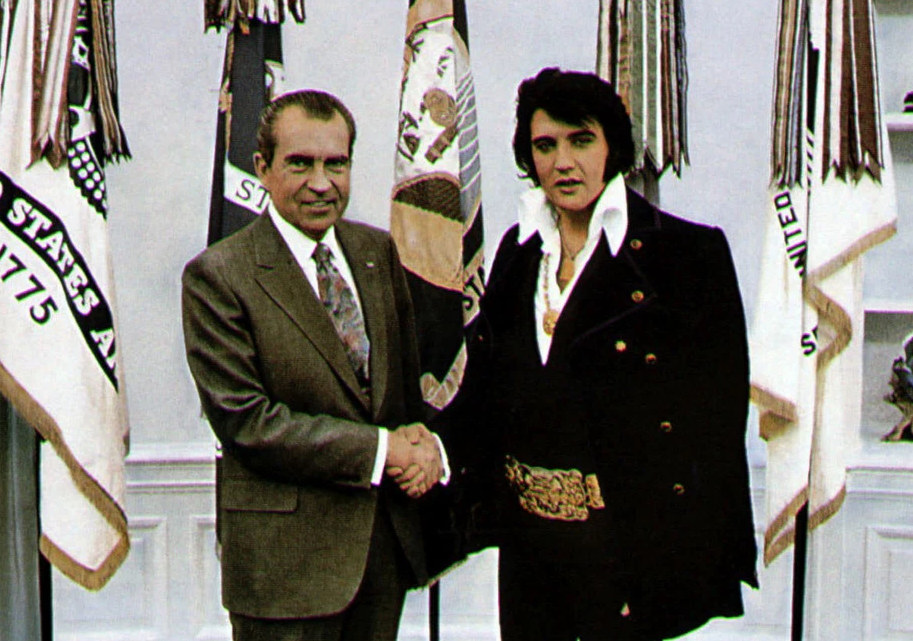What We Talk About
When We Talk About Elvis
From American History magazine, August 2007
He never held elective office, but that won’t matter to his legions of admirers. You watch — some day, somewhere, someone is going to carve his face into the side of a mountain. He won’t make it on Mount Rushmore, but there are probably a few sculptors-for-hire sizing up one of those bluffs along the Mississippi on which his hometown, Memphis, proudly sits.
He’s been dead for three decades and in some ways, death was a good career move. He continues to earn money — millions more each year than he did when he was alive — and new generations come to him, still transfixed by the quavering, shadowy voice singing “Mystery Train,” recorded more than a half-century ago. Even in death, he still has the power to take us into the dark places of our souls, where we are surrounded by sorrow and loss.
The arc of his life has taken the form of an American epic and for those who were alive in the 1970s, when he jumpsuited across the nation’s concert arenas, it’s difficult to accept the fact that he is a historical character now, as distant to young people today as talkies and Model T’s were to those of us now steeped in the bathwaters of middle age. He is the first rock’n’roll personality to assume near-mythic status in death, but there is no denying that his influence was felt far beyond the world of the teen-age consumers who put him on America’s social and economic map. When he died 30 years ago – down at the end of Lonely Street – the isolation that was a byproduct of his enormous fame soon was part of his version of the American Tragedy.
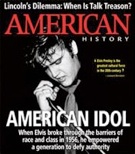
He became the property of history, in his own way the equal of a president, a military tactician or an inventor.
Elvis Presley was born in poverty in 1935 and died enormously wealthy and reclusive in 1977. It has been 30 years since the world was stunned by the news of his death. During the last years of his life, he was the butt of jokes (many quite cruel) about his weight. A dependence on chemicals for waking, sleeping and momentary fits of happiness eroded his body and soul.
Sometimes in concert, he stumbled over words and on a couple of occasions, split his pants. Yet somehow the majesty of his voice and his status as the embodiment of the American Dream, in all of its splendor and squalor, triumphed over his human shortcomings.
It’s hard for people of a certain age to take Elvis seriously. After all, we know how the story ended: an eccentric, isolated drug abuser keeled over in his bathroom while reading The Scientific Search for the Face of Jesus. Looking back, we should have seen that end coming. But when Elvis died, we weren’t ready to lose him. For the rock’n’roll generation – Baby Boomers, mostly – it was taking-stock time. Elvis dead? Maybe rock’n’roll wasn’t here to stay after all. In that case, what could we count on?

But we got over it. John Lennon was murdered. George Harrison died of cancer. A Beach Boy drowned. We grieved, but the planet continued to spin. Our youth faded, but Elvis endured, showing astonishing staying power for a dead guy. Maybe we should consider why he’s still a Colossus of American entertainment.
There really are two Elvii – the living, breathing man who walked the earth and the icon, whose symbolic value is so strong that he remains the embodiment of both the greatness and the self-indulgent excess of this nation, long after the death of that first Elvis.
Whether you define the American dream economically or socially or merely as the delirious pursuit of fame, Protoplasm Elvis achieved it all. Born in a shotgun shack in Tupelo, Mississippi, he was a twin whose mate died. Raised by doting but hapless parents, he was prepared for a life of low-rent mediocrity in a Memphis housing project. Then in 1953, while on lunch break from his first post-high school job as a truck driver, he stepped into the Memphis Recording Service to cut an acetate of his singing voice. The woman supervising the recording, Marion Keisker, heard something special and switched on the tape recorder. When the owner of the business, Sam Phillips, returned to the studio later, she urged him to listen to this “kid with sideburns” and give him a chance. Phillips did. He liked the kid but didn’t think he was anything special until one night the following July. He’d finally put Elvis together with another young man, guitarist Scotty Moore. With bass player Bill Black, the trio had spent the evening noodling through a series of bland ballads. During a break, while Phillips was winding tape in the control booth, the three boys were standing by the soda machine when Elvis took Scotty’s guitar and began playing a blues song.
“What are you doing?” Phillips asked, poking his head out of the booth.
The boys shrugged. “We don’t know.”
“Well, back up, try to find a place to start, and do it again.”
The result was the first Elvis Presley record, “That’s All Right, Mama” on the A-side and “Blue Moon of Kentucky” on the B-side. The first was a blues song by Arthur “Big Boy” Crudup. The other was a country waltz by Bill Monroe and His Bluegrass Boys. Both were performed in a hybrid style that came instinctively from Elvis. He was a product of the poor-white subculture of the South. Yet he loved black music. When he played the Crudup song, it maintained its origin, but Elvis kept his country roots intact. And when he played “Blue Moon of Kentucky,” he sang it with the fervor of a black blues shouter. That single, released on Sam Phillips’ Sun Records label in 1954, set a high standard for rock’n’roll.
There, on that yellow-labeled Sun Record (catalog number 209), he did what the Supreme Court tried to do that year in Brown v. Board of Education: he brought black and white America together. This music that we came to call rock’n’roll was a metaphor for a nation feeling the growing pains of integration. Two things that were clearly separate could be brought together and when they were, something better could result.
That’s not over-stating Elvis’s importance. He never marched with Dr. King or took part in a sit-in, but he made contributions that helped America through its mid-life crisis. He continued to record his version of the African American songbook. He befriended black artists. As an interpreter, he pointed his audience toward the original (black) sources of his music and just by his being, he opened the mass audience for black performers who had been denied that pleasure. At that point, Protoplasm Elvis became Symbolic Elvis.
Elvis, Scotty and Bill burst out of Memphis in 1954, recording the basic DNA of rock’n’roll in the course of a year. They took their act out of the studio, playing shows in Memphis and other hospitable venues in the South. But after a turn-down by the Grand Old Opry (Elvis was urged to return to his previous job as truck driver), he found a regular gig on a rival weekly country music radio show called “Louisiana Hayride.” The show helped build Elvis, Scotty and Bill into a regional success. When Colonel Tom Parker, manager of country crooner Eddy Arnold, heard about Elvis, he hitched his wagon to that particular star. Soon, Elvis’ fame spread beyond the mid-South. The boy with the odd name started drawing insane, frenetic crowds. Colonel Parker negotiated a contract for his new client with RCA Victor and arranged a $35,000 buyout from Sam Phillips at Sun. In January 1956, the music of Elvis Presley was loosed upon the earth by one of the world’s largest record companies. The Elvis revolution had begun.
Television soon beckoned. Still an oddity itself, the new medium was drawn to weirdness and the thing called Elvis Presley seemed pretty damn weird.
Milton Berle, known as “Mr. Television” in the early days, invited Elvis onto his variety show at the beginning of April. But it was Elvis’ second visit on June 5 that grabbed the nation’s attention. Elvis sang and swiveled and his lascivious bump and grind was more than the television audience could reasonably stand. It was the talk of the water cooler the next day. He was vulgar. He was an animal. Voices from the pulpit lashed out at Elvis, guaranteeing that the curious would be in front of their grainy black-and-whites when Elvis showed up on the most important television variety program, “The Ed Sullivan Show.”
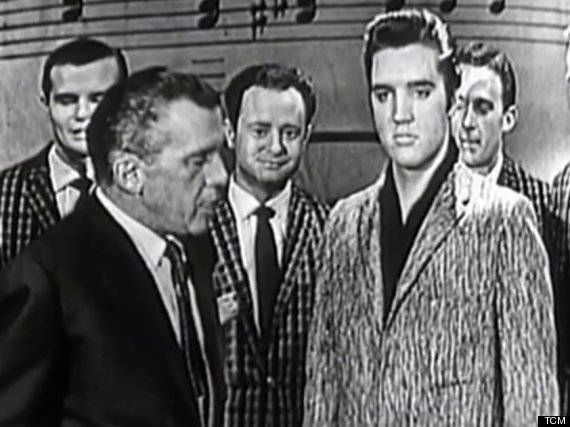
Ed Sullivan wasn’t even on “The Ed Sullivan Show” on Sept. 9, 1956. He’d been injured in an automobile accident a month before and so it was portly English actor Charles Laughton who introduced Elvis to Sullivan’s huge audience.
From the waist up.
The CBS Standards and Practices Office said Elvis was fine above the waist, but viewers should not be allowed to see his thrusting hips. Elvis sang “Don’t Be Cruel,” “Hound Dog,” “Reddy Teddy” and “Love Me Tender.” A month later he came back – again from the waist up, but this time with a healed Ed Sullivan to introduce him – and sang “Don’t Be Cruel,” “Love Me Tender” and “Hound Dog.”
The TV appearances, though toned down by the camera angle, built more anticipation for Elvis’s shows, as he barnstormed the country – for the first time, finding an audience outside the Deep South – and prepared the masses for his third Sullivan show appearance.
This time, Elvis got the full body treatment. On January 6, 1957, all of Elvis showed up alongside Ed Sullivan and sang “Hound Dog,” “Love Me Tender,” “Heartbreak Hotel,” “Don’t Be Cruel,” “Peace in the Valley,” “Too Much” and “When My Blue Moon Turns to Gold Again.”
Eight months after Elvis’s television debut, the world was finally ready for his hips and there was no turning back.
What made Elvis an agent provocateur? Theories abound. The leading lunatic theory is that he was a space alien. The more prevailing opinion is that he was a product of the magic medium of his place and time.
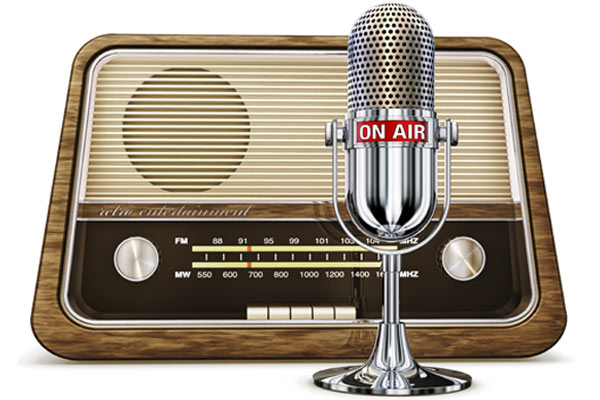 Radio was the magic medium. Let us now praise that great, subversive force in American culture. Radio helped Elvis develop his interest in and affection for the music of black culture. In that pre-rock’n’roll era, America was an apartheid nation and in much of the country, black and white didn’t mix. They attended separate schools (with the approval of the United States Supreme Court) and they didn’t shop together, worship together or live in the same neighborhoods. Segregation was relatively easy to enforce. It was the law. Whites lived here, blacks lived there.
Radio was the magic medium. Let us now praise that great, subversive force in American culture. Radio helped Elvis develop his interest in and affection for the music of black culture. In that pre-rock’n’roll era, America was an apartheid nation and in much of the country, black and white didn’t mix. They attended separate schools (with the approval of the United States Supreme Court) and they didn’t shop together, worship together or live in the same neighborhoods. Segregation was relatively easy to enforce. It was the law. Whites lived here, blacks lived there.
But radio did not obey the law. Radio traveled through the air and the air did not recognize arbitrary lines drawn by men. Radio did not respect Jim Crow laws and so it became the great unsung subversive force that brought about radical social change in America.
Say you’re a black kid living in the segregated America at the beginning of the 1940s. You tuned the radio at night, during that magic time when the ionization layers shifted. You picked up a station you couldn’t hear in daylight, playing something strange, something truly foreign. For a moment, you wondered if you’d picked up a signal from another planet and then you heard a recognizably human voice: “And welcome back friends to the Martha White portion of the Grand Ole Opry . . . .”
You’re black. You couldn’t go see the Opry; you wouldn’t make it in the front door. But you could hear it on the radio on Nashville’s clear-channel WSM.
Some of the music was strange. Maybe you made fun of it. But some of it touched you somewhere you couldn’t name. And maybe you thought that you understood something in the music you didn’t know was there.
It worked the other way too. White kids tuned the dial and you found WDIA in Memphis (”Mother Station of the Negro” was its slogan) or maybe WLAC, out of Nashville. You’d never even seen a black person … there weren’t any in your town. But suddenly, you found this music . . . and it was like nothing you’d ever heard before.
The Presleys were poor, but they did have a radio and that was the music Elvis heard that ignited him. The music also rose from his religious beliefs – a bond forged in poverty and not by race – that led his family to tent-show revivals where heard gospel music sung as no white person could sing it. (Years later, during his Vegas period, Elvis ended up after hours singing gospel music through the night with James Brown. Brown said Elvis was the only man he knew, white or black, who knew more gospel songs than he did.)
What became rock’n’roll in the 1950s arose from the twin subcultures of poverty in white and black America. The music-industry’s official term for black music was “race” and for the white country music it was “hillbilly.”
They appeared so different on the surface, but they had much in common, both different shades of the blues.
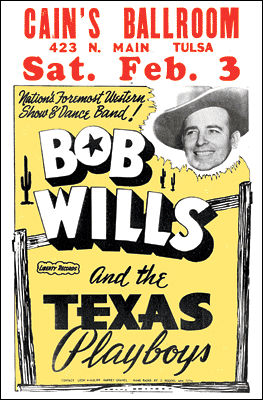 And though there is truth to the claim that rock’n’roll is just black folks’ music played by white guys, the road did go both ways. Standing on a flatbed with his fiddle and his trombone players, country swing entertainer Bob Wills and his band, the Texas Playboys, introduced their poor white audiences to their interpretations of songs heard on Negro radio stations.
And though there is truth to the claim that rock’n’roll is just black folks’ music played by white guys, the road did go both ways. Standing on a flatbed with his fiddle and his trombone players, country swing entertainer Bob Wills and his band, the Texas Playboys, introduced their poor white audiences to their interpretations of songs heard on Negro radio stations.
And up in St. Louis, a black kid named Chuck Berry learned to write narrative songs by listening to the Grand Old Opry on Saturday night.
It took a while, but radio sparked a musical revolution that led to a social revolution.
Elvis was the visible embodiment of the musical revolution. He was an interpretive artist, not a creative artist (no matter what the record-label credits say, he did not write his songs). There were many musical innovators who experimented with blending musical styles, but they all lacked the charisma, the charm, the look . . . the everything that Elvis had and that he represented. Hearing him was liberating. He was a catalyst; his was the face that launched a thousand hips.
“Hearing him the first time was like busting out of jail,” Bob Dylan recalled. “I just knew that I wasn’t going to work for anybody; nobody was going to be my boss.” Elvis shook awake a generation. “Without Elvis Presley, none of us could have made it,” Buddy Holly said. Chuck Berry . . . Bo Diddley . . . Little Richard – without Elvis, how many of them would have found a mass audience? Dylan, The Beatles, The Rolling Stones – they all said they did what they did because of Elvis. Keith Richards said he’d likely be an accountant today (Lord help us) if he hadn’t heard rock’n’roll.
Elvis was the coalescing force that brought it all together. Perhaps Ray Charles could have been the king of rock’n’roll – if had wanted to and if America would have accepted a blind black man as a teen idol. Bo Diddley’s percussive guitar playing gave rock’n’roll much of its foundation. Little Richard, the architect of rock’n’roll, brought church rhythms into the new music. Chuck Berry, Fats Domino and other early black rock’n’roll stars found the door to the mass audience opened, in part, because Elvis came first and symbolically held it for them.
Someone needed to be first and to earn mass acceptance, Sam Phillips believed that someone had to be white.
Phillips, the visionary at Sun Records, loved black music and was more steeped in it than Elvis. He realized that in order for the music to carry over to the mass audience, it needed to be introduced by a white artist. He had long mused about finding such a person who could have the depth of feeling of the black artists he had recorded.
And then a truck pulled up in front of his studio and a 19-year-old kid got out and came inside to make a recording of his singing voice.
Peter Guralnick, the author of the brilliant two-volume biography of Elvis – Last Train to Memphis and Careless Love – often precedes his writing on Presley with a quote from a 1923 William Carlos Williams poem: “The pure products of America go crazy.”
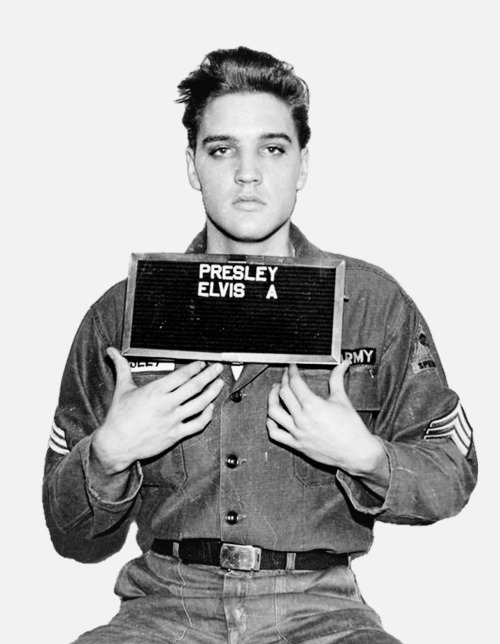
Elvis was Horatio Alger with a guitar. A real Johnny B. Goode, he came from humble beginnings, found fame, fortune and loneliness.
Dreamers seldom think about what will happen when they wake. Elvis achieved the material riches of the American dream, but what he earned was suffocating fame. Unable to go out to the movies, he rented theaters and arranged private screenings in the middle of the night for himself and his entourage. Unable to treat his daughter to a day at an amusement park, he paid a full-day’s profits so he and his child could ride a Ferris wheel without being pestered. Unable to develop real friendships, he filled his payroll with the hired yes-men of the “Memphis Mafia.”
If his life was the embodiment of the American dream that hard work and virtue will earn rich rewards, it also was a testament to the nation’s excess and eccentricity. A culture that exalts pet rocks, shag carpet and mood rings would have to invent an icon like Elvis Presley, if one did not already exist.
When he returned in 1960 from military service overseas, the young and beautiful Elvis was gone. The new Elvis no longer performed in public but instead sleepwalked through horrifyingly bad movies that nonetheless scored at the box office (so huge was the world’s love for him). He was isolated from the world and the rock’n’roll he had made possible. The Beatles – who owed him a tremendous debt – eclipsed him and were thrilled and disturbed when they finally met him. After a bizarre afternoon with Elvis, Paul McCartney was asked how it was to be with the king of rock’n’roll. “Odd,” was all he said.
He was no longer the contradiction that was early rock’n’roll Elvis – the boy with the sneer, who nevertheless yessired and yesma’amed his way into our hearts, wearing just a hint of eye shadow and a wardrobe of pink and black. After the military career, the rebellious anger was gone from Elvis and from the music he had inspired. In his absence, the music industry co-opted the elements of rock’n’roll and softened the edges for mass consumption.
Elvis became a legendary eccentric: Picasso had his blue period and Elvis had his meatloaf period. In one six-month stretch, he ate meatloaf three meals a day. Let’s not forget the cars he bought by the dozens, his obsession with police badges or his peanut-butter-bacon-and-banana sandwiches. Every oddity of his life – his jungle room at Graceland, his propensity for shooting out television sets – was chronicled and studied for meaning, even when none was evident. Yet his weirdness was endearing and part of the great American tradition of peculiarity.
Near the end of his lost decade, Elvis rehabilitated himself. In 1968, he made a television program that showed that he hadn’t lost it as a performer. He returned to Memphis to record and sang songs he cared about, not the movie-soundtrack schlock he’d been warbling. Against the advice of his don’t-rock-the-boat manager, he recorded songs with strong racial themes.
Then, after not appearing in concert for more than a decade, he became ubiquitous – showing up in his white jumpsuit in West Palm Beach, Omaha, Tacoma and most any point in between. Depending on which Elvis walked onstage, the shows could be sublime or ridiculous. He could reach inside and pull out hope or despair, and achieve real magnificence with his stunning voice. Or he could sleepwalk through his set, dwell in the lower register for the whole evening and turn his singing into an exhaled vowel movement.

His career was one of extremes. When he cared, he found songs in which he could invest his soul and earn a monumental divided. But other times, he sang to fulfill contracts, the same way he had made those awful movies. He had given up the movies to return to performing and at first, his excitement at being in front of a live audience resulted in spectacular concerts. But even those shows became like the bad movies – a routine difficult at times to distinguish from piling bricks.
Then he committed the ultimate sin: He aged. His young and beautiful face became puffy. His once-slender body betrayed him, widening, spreading. The white jumpsuits accentuated his controversial girth. He was mocked by millions, but those fans who had grown up with him maintained their obsession. They identified with him because they too came from humble beginnings. He had suffered great heartbreak, losing first his mother and then his marriage. He had so much, his fans thought, but what did he really have in the end?
The economic gulf between Elvis and his audience could be erased in these moments.
Unlike them, he had gotten everything he wanted. Like all American children, he dreamed of growing up as the hero of his own life, to have all the riches he could imagine and to live in a castle. He got it all. Was it the achievement of those desires that left him dissatisfied and perhaps insane?
America continues its fascination with Elvis, in part because he achieved success in all of the usual definitions, yet still failed to find happiness. He validates us. We might all lust for the material things and the fame that he attained. But because we can’t reach that goal, we take satisfaction in seeing that he made it to that promised land and found it empty. We need to know that It is not enough. Elvis helps us make sense of our own lives: you can have it all but still have nothing.
And maybe we need Elvis to remind us of when we were young and beautiful. He was the spirit of youth and excitement, both frightening and oddly comforting. He could only have come from America; he was everything good about the country, and at the same time was a living embodiment of the nation’s excesses and its occasional grotesqueries.
Time passed and he aged, over-indulging and decaying. Guralnick was wise to pluck that line from Williams’s poem because it explains Elvis Presley’s life: The pure products of America go crazy.
And still we love him.
Through those songs and pictures and old television shows and even in those bad movies he has been given the gift of being preserved at his best.
We rarely see Elvis near the end. When we see his picture or his performances on television, it’s the young Elvis, full of passion and promise.
Creating art allowed him to beat the odds and find immortality, without having to do the whole Doctor Faustus thing.
So we remember Elvis the way we want to remember ourselves and our country – at our best. We take comfort in the enduring possibilities of our potential and do not dwell on our failures.
When we hear Elvis sing “Good Rockin’ Tonight” or “Baby, Let’s Play House,” he is still young and beautiful and undeniably the King. We know how his story ends, but for that moment, when we hear that 20-year-old voice across half a century, he’s not really gone. He’s still with us, forever young, ready to be discovered by new generations of listeners, telling them of the promise that all of us once had.
